Cuneiform tablets, jewels, and 1,800 coins, including one bearing the name of Shimon Bar Kochba, found in antiquities trader’s house in Modiin
By Ruth Schuster, HAARETZ May 19/22
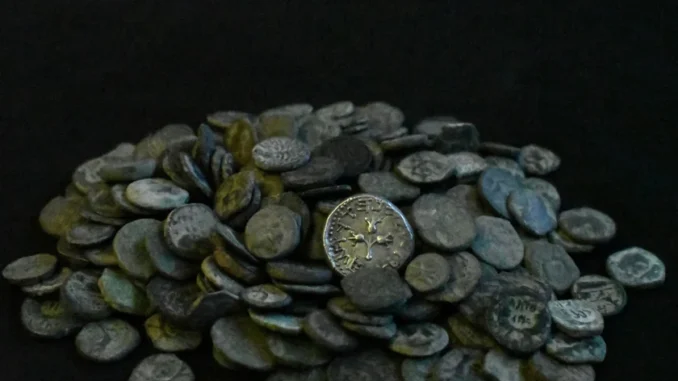
Ancient coins.Credit: Yoli Schwartz<
>
A vast cache of antiquities looted from sites in the West Bank was revealed on Thursday by the Israel Antiquities Authority.
While antiquities theft is common in Israel, and thieves and traders are often caught, this was a big catch.
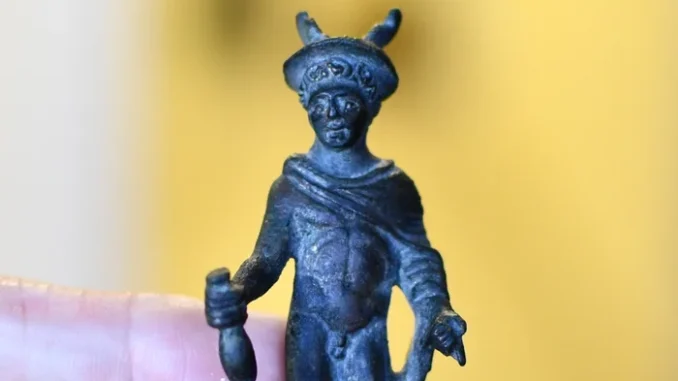
Ancient cuneiform tablets, a bronze figurine, jewelry, seals, and no less than 1,800 coins were seized from the home of an antiquities trader in Modi’in on Sunday by police working with the Israel Antiquities Authority theft prevention team.
According to the IAA, the trader admitted to buying antiquities from looters operating in the West Bank, smuggling them into Israel, and illegally trading them.
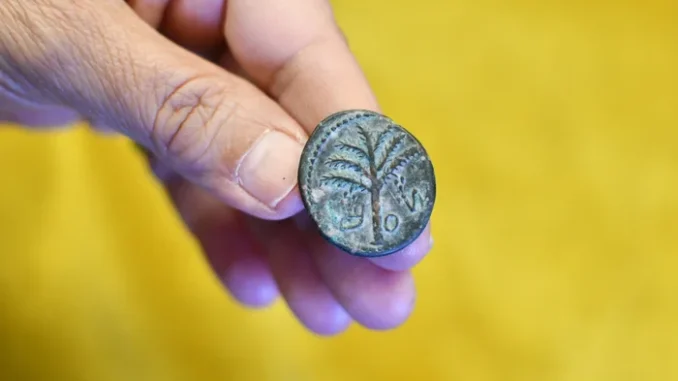
Some of the items and coins appear to have fresh dirt on them, the inspectors reported, lending credence to the suspicion that they were looted recently.
Some of the coins bear the name of Shimon Bar Kochba, the leader of the ill-fated revolt against the Romans from 132 to 135 C.E. The inspectors also seized coins from the Persian period, silver coins from the Hellenistic period, more from the Hasmonean period and others from the time of the rebellion, the IAA announced on Thursday.
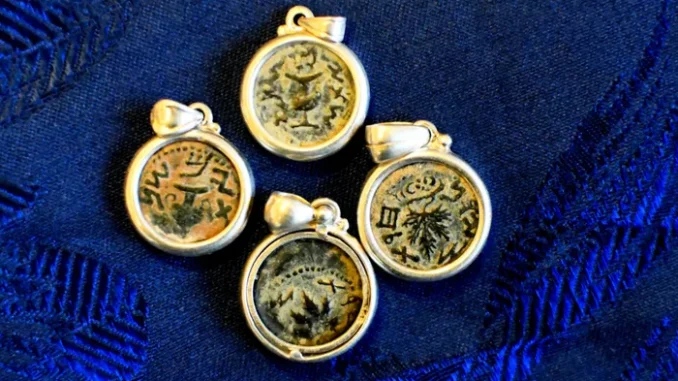
Ancient coins.Credit: Yoli Schwartz
One rare item was a silver “shekel” coin from the time of the First Jewish-Roman War in 67 C.E., the IAA stated. It bears the legend “Holy Jerusalem” in Hebrew on one side with the image of a bunch of three pomegranates. The other side says “Shekel Israel Year 2” (the letter bet) and the image of a goblet.
- Fake treasure maps and savvy thieves: A day in the life of an antiquities crime-buster in Israel
- Little Denisovan girl’s tooth found in Laos, proving species’ vast range
- Archaeologists find unexpected source of stone for King Herod’s bathtubs
That particular coin seems to have been in the process of being cleaned, a job only half done, the IAA says.
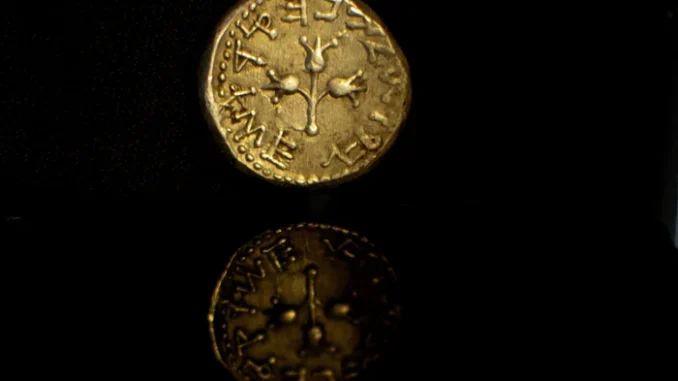
An ancient shekel coin.Credit: Yoli Schwartz
Some of the seized coins had already been packaged in envelopes for mailing abroad. The suspect is not licensed to sell antiquities overseas, said IAA theft prevention chief Ilan Hadad. The next stage of this case is to track down the thieves, the anti-theft unit said.
Eli Eskosido, the director-general of the IAA, mourned that the illegal trade encourages looters who do not cavil at destroying ancient sites, to the detriment of posterity.
“The worst thing about destroying a site is that you only have one shot at excavating,” antiquities inspector Hillel Silberklang told Haaretz in February. “Whatever information it had is lost forever, and damage to an archaeological site is final.”
***
Massive bust of illegal antiquities trade seizes 1,800 coins and ancient artifacts
Man from central Israel suspected of smuggling thousands of priceless treasures abroad for years through an online store
Today, 12:31 pm <
>
<
>
<
>
In one of the biggest busts in Israeli history, the Israel Antiquities Authority’s theft prevention unit has recovered over 1,800 ancient artifacts from an unlicensed dealer in the central Israeli city of Modiin. Mostly coins and jewelry, the artifacts also included cuneiform tablets and bronze statuettes.
The items were seized on Sunday after a judge granted a wide-ranging search warrant of the dealer’s private home.
IAA antiquities’ trade supervision Ilan Haddad told The Times of Israel on Thursday that the IAA periodically checks all online antiquities auction platforms, including eBay, as well as new online storefronts out of Israel. The Modiin-based suspect, a man in his 50-60s, was identified through his online store, which was linked to an Israeli IP address.
According to an IAA press release on Thursday, the IAA unit searched the man’s home with the help of Modiin police. In the course of his interrogation, the suspect admitted to illegally trading, smuggling abroad, and purchasing illegally excavated coins from pirated digs in the West Bank. It is assumed that thousands of coins have made it overseas.<
>
<
>
Haddad likened the capture of the suspect to that of a mafia boss. “The soldiers on the ground are the little fish, and, essentially like the mafia, the money is the engine that pulls the train,” he said. The unit is working to expose those who carried out illegal excavations and took the coins from the ground.
Among the seized items are hundreds of rare coins, some of them dating from the Persian and Hasmonean periods, several minted during the Great Revolt, and, tied to Thursday’s holiday of Lag B’Omer, coins inscribed with the Jewish leader Shimon Bar Kochba.
Dozens of the seized coins were found inside addressed postal envelopes, awaiting shipment.
Haddad said it is impossible to know where the items are from, but assumes that many of the coins are from the West Bank. “If we don’t arrest someone at the site, there is no context for the artifacts and no way to accurately place them,” he said.
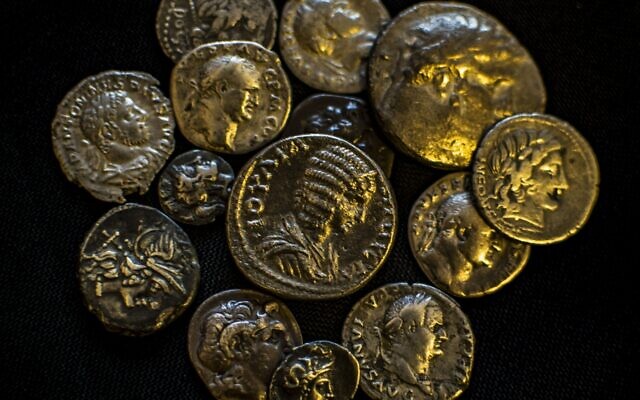
Some of the ancient coins seized in a massive illegal trade bust on May 15, 2022. (Yoli Schwartz/Israel Antiquities Authority)<
>
<
>
Specific details of the suspect and the ongoing investigation are still under wraps, but Haddad confirmed that the Modiin home was the base of the illegal trade and that the suspect has presumably been participating in this trade a long time.
“He is knowledgeable in archaeology, knows how to clean the coins and price the items. He is very professional,” said Haddad.
Among the items seized on Sunday is a silver “shekel” minted during the Great Revolt in 67 CE. The coin was discovered half-cleaned in the suspect’s study, according to the IAA press release. One side bears the inscription “Holy Jerusalem” and a bunch of pomegranates. The other side is inscribed with “Shekel Yisrael Year Two” above a trophy.
Haddad said he and the entire theft prevention unit were working around the clock to stop thieves who are destroying archaeological sites, but without the backup of legal deterrence, they have no teeth. According to the Antiquities Law, the suspect could face up to two years in prison. But this sentence is almost never handed down, he said.
“Judges tend to be lenient. After all, we’re not talking about rape or murder. But we hope for a punishment that will deter others from participating in this collective theft of our country’s heritage and the heritage of the entire Jewish people,” said Haddad.
Haddad appealed to the public to help the unit stop this illegal trade, including hikers who see something suspicious on the ground or individuals who are approached by dealers. But his true target is the authorities.
“If we can raise the awareness with judges and legislators about the importance of these antiquities to the country, and to the Jewish people, things may change. Let’s stop letting our heritage be sold under our feet. This is our story, but soon we won’t have anything left to help tell it,” said Haddad.
<
>
<
>

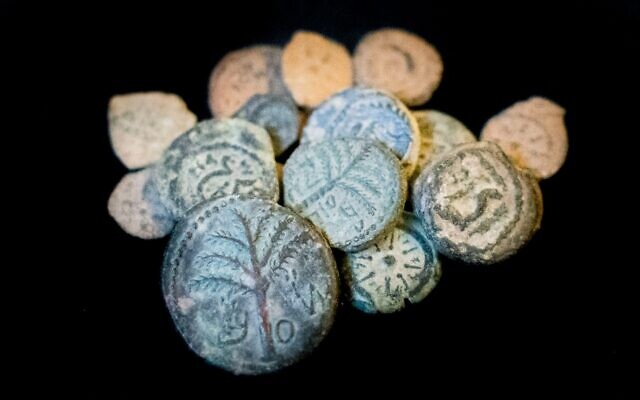


Leave a Reply
You must be logged in to post a comment.